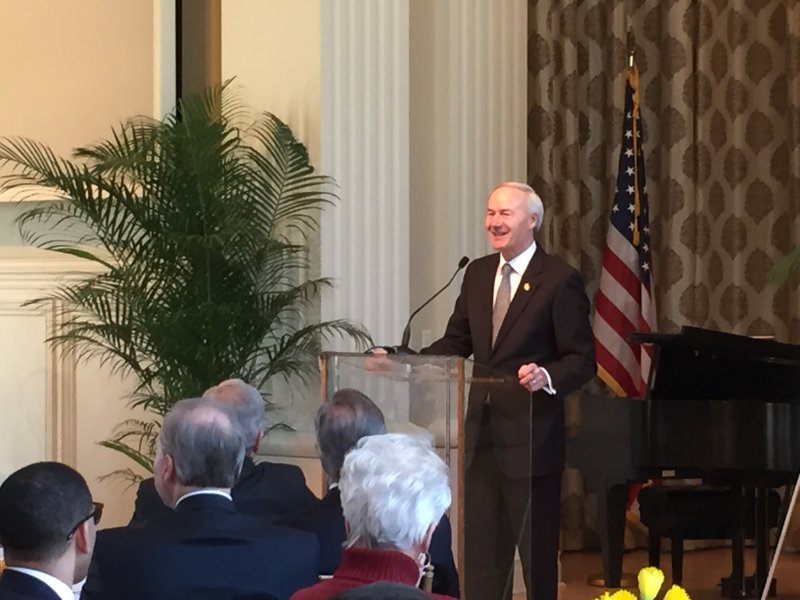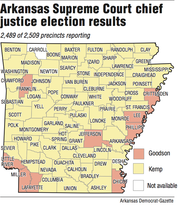After candidates targeted by out-of-state groups lost their Supreme Court races, Gov. Asa Hutchinson said Wednesday that he stands behind ending elections to fill appellate court seats.
RELATED ARTICLES
http://www.arkansas…">Will support Trump as nominee, Hutchinson says http://www.arkansas…">Democrats push to add ethics bills to state session http://www.arkansas…">Governor says vote buoys his Medicaid plan

RESULTS
FULL ELECTION COVERAGE
Hutchinson said “dark money” — a term for money spent on political causes by groups that don’t have to disclose their funding sources — was a “regrettable” winner in Tuesday night’s elections.
Out-of-state groups and dark-money ad campaigns are nothing new to political races, but those candidates have ways of minimizing their effect, Hutchinson told reporters.
“But in judicial races, it’s much more difficult,” Hutchinson said after a meeting of the Political Animals Club. Judicial candidates are nonpartisan by state law, and they have rules on how they can campaign. “Because of what we saw in Arkansas and the influence of that money, the debate on how we should reform the selection of our Supreme Court justices in Arkansas will continue and the Legislature will consider changing the way justices are selected next year.”
Hutchinson said he has spoken with the chairman of the House Judiciary Committee, Rep. Matt Shepherd, R-El Dorado, who has led past efforts to end appellate elections and replace them with a “merit selection” system.
According to the American Bar Association, Arkansas is one of 21 states that elects its appellate judges.
Hutchinson said he expects some form of legislation in 2017 and that if it’s “in the right form,” he would support it.
When asked what the state could do about “dark money” groups, Hutchinson said they are protected by freespeech rulings from having to disclose the source of their contributors. Those types of organizations multiplied after the 2010 U.S. Supreme Court decision Citizens United v. FEC.
“I think a better direction to go would be to change the Arkansas way of selecting our judges,” the governor said.
Circuit Judge Dan Kemp of Mountain View defeated sitting Justice Courtney Goodson for chief justice. Shawn Womack, a former Republican state lawmaker and sitting circuit judge, beat Little Rock trial attorney Clark Mason.
Negative ads from outside groups were aired against Goodson and Mason, while no such ads targeted Womack or Kemp. Negative advertising from an out-of-state group also was a factor in the 2014 Supreme Court race between Robin Wynne and Tim Cullen, who was the target of the ads and lost the race.
With 2,489 out of 2,509 precincts reporting late Wednesday afternoon, The Associated Press reported that unofficial results in the chief justice election were:
Kemp . . . . . . . . . . . . . . 328,201
Goodson . . . . . . . . . . . 251,098
In the election for Position 5 on the Supreme Court, unofficial results were:
Womack. . . . . . . . . . . . 373,735
Mason . . . . . . . . . . . . . 180,610
This year’s two Supreme Court races saw more than $1.3 million spent on TV ads on Arkansas affiliate stations, according to federal records. That figure breaks the previous record for spending on state Supreme Court races, $450,320 in 2010, according to watchdog group Justice at Stake.
Mason outspent Womack in advertisements, but the most money in the race was spent by a Washington, D.C., group called the Republican State Leadership Committee. The committee, with no official connection to the national party, spent nearly $400,000 in ads and other materials targeting Mason.
Mason’s campaign spent $69,460 on ads with Arkansas TV affiliates while the Republican State Leadership Committee spent at least $175,375 on ads that referred to Mason’s legal work and dubbed him “Clark Ka-Ching Mason.”
In the final month of the race for chief justice, a group called the Judicial Crisis Network bought 1,470 30-second ads that painted Goodson as a friend of trial lawyers and a judge who was a part of the “liberal” agenda of President Barack Obama.
The group spent at least $622,435 on Arkansas airwaves to attack Goodson. By comparison, Goodson’s campaign spent $340,365 on ads on state affiliates while Kemp bought $110,720 in local TV ads, according to federal records.
Goodson branded herself as a fighter for Arkansans’ “conservative values,” but she was targeted by a group that has spent millions on the campaigns of conservative judges in other states, according to Justice at Stake.
Both Womack and Goodson previously said they opposed ending judicial elections.
Kemp said Wednesday that such a move would be up to a vote of the people but that he is interested in finding a way to change the current system.
“The state of Arkansas, we can’t change [the Citizens United ruling]. But there’s certain things we can do. What I would foresee is we have a committee to study what other states have done to make more transparency in their elections, specifically their judicial elections,” Kemp said Wednesday. “Let’s look at a modification of the rules we’re working under right now. If there is an amendment for the appointment of appellate judges, then that’s the system we’re going to follow.”
Although the Judicial Crisis Network spent more on TV ads than what he and Goodson spent, Kemp said he didn’t think the negative ads had much of an effect on the outcome.
“We’d have been successful in getting elected anyway,” he said. “We were in a good position at the time these ads started.”
Josh Silverstein, a law professor at the University of Arkansas at Little Rock, said Tuesday night’s results were disconcerting given the amount of out-of-state money that poured into the state elections.
Without some changes — be it disclosure laws for spending or scrapping elections altogether in favor of a merit selection process — Silverstein said the next race will be the same.
“Judicial elections are, by their very nature, low-information elections. It’s much harder for the voters to get useful information, and they understand it less when it comes to judicial elections,” Silverstein said. “The dark money? We can’t stop it. It can’t be stopped.”
Silverstein said he thinks that some disclosure changes are possible but that they still wouldn’t deter the outsize effect money has in such races.
Silverstein said there are volumes of studies and data to show that judges’ rulings can be affected by campaign contributions or the looming thought of an election. By using a selection method, the bench can be partially insulated from outside pressure and be more empowered to rule on the merits and the law.
“Let me concede that any merit-based system will be influenced by politics. … If Hutchinson appointed judges, he’ll appoint judges that [conservative groups] will like more. … You can’t get politics completely out of law,” Silverstein said. “The question is, what’s the lesser evil? We’re not searching for the perfect system but the best system.”
Spending in state supreme court races has been growing over the past 20 years, Silverstein said, and has now been amplified by spending from anonymous groups.
In many states, he said, conservative groups have sought to improve protections for businesses through the election of judicial candidates who are amenable to “tort reform” legislation. Such legislation reduces awards in lawsuits.
In 2011, Goodson joined a unanimous ruling that struck down part of the state’s tort reform law, a law that had been championed by Womack.
“There’s a lot at stake here. Spending $400,000 for a single Supreme Court justice is a very rational move when that justice could be the vote that saves the industry tens if not hundreds of millions [of dollars] in tort remedies,” Silverstein said. “You’re getting more bang for your buck.”
Hutchinson said he has spoken with the chairman of the House Judiciary Committee, Rep. Matt Shepherd, R-El Dorado, who has led past efforts to end appellate elections and replace them with a “merit selection” system.

